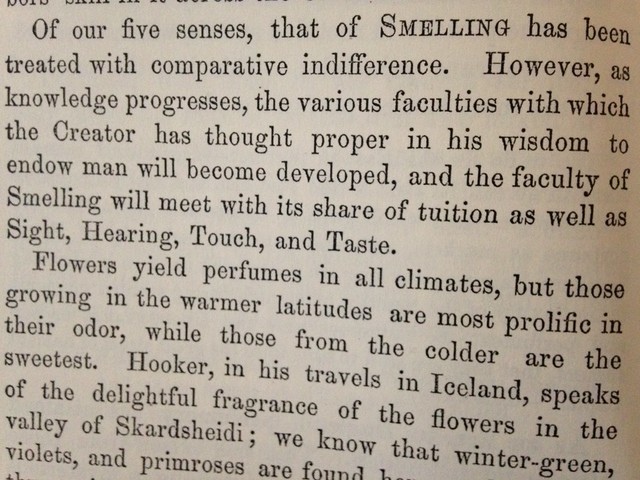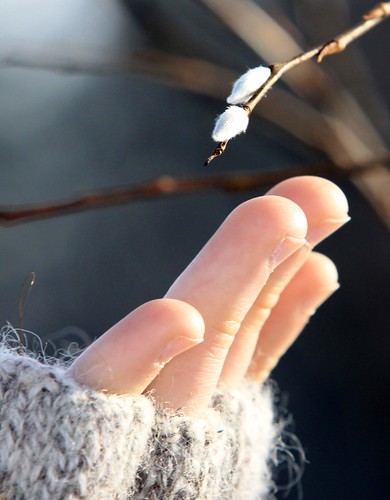Nonscents

I've been dragged without prior consent into one of those stilly twitter wars. With a non-scentie, of all folks. I realize this is part of the aftermath of being on national radio, and if you are doing something unusual, there has to be someone out there that is out to get you and direct all sorts of life frustrations towards you without you even triggering anything intentionally.
Consequentially, this turned into an opportunity to educate people about the sense of smell, and break some ridiculous myths that so many uneducated people who either look down at this sense, or erase an entire realm of experiences from their life simply by ignoring this sense. My frustration with this attitude is not new to the perfumer. Here is a quote from Piesse's book, originally published in 1857:
"Of the five sense, that of SMELLING has been treated with comparative indifference. However, as knowledge progresses, the various faculties with which the Creator has thought proper in his wisdom to endow man will become developed, and the faculty of Smelling will meet with its share of tuition as well as Sight, Hearing, Touch and Taste" (G. W. Septimus Piesse, "“The Art of Perfumery”).
Some of the statements and assumptions that came up in that weird twitter dialog:
1) That all perfumes cause "allergic reaction" - which is not actually true. Just because you have a reaction, does not mean it's an "allergy". Sneezing does indicate allergy. Headaches, however, do not. Even respiratory symptoms that sometimes people experience are often emotionally induced. I truly only wish there was more research done on that. But because perfumes are made from such a vast array of substances, it has become a common practice to just give those reactions an umbrella name such as "allergies" because no one can argue with you when you return something to the store (or the kitchen) claiming it gave you an allergic reaction. Saying that you "didn't like it", however, may not reap the desired results (full refund, or a new dish made for you). The most commonly reported reaction is headaches - which is not an allergic reaction at all, but technically a stress response of the body. If you're overwhelmed by a scent (either because of overdose in your environment, or because you have a negative association with smells in general or a particular scent in particular) - your scalp muscles may tense up, which in turn creates a headache. That's how most headaches occur - sometimes because of direct life tensions (work deadline, fighting at home, or subconscious tensions that we're not aware of their origin - which is most likely what scent triggers in some people). Migraines are a different thing, but still have more to do with the nervous system rather than anything to do with autoimmune (which is essentially what allergic reactions are). And a lot of people call a very strong headache "migraine" even when it is not.
2) Speaking of negative reaction to scents, tension and psychology: I long argued that the "allergic" claims of antiscenties has more to do with a Pavlovian reaction to smell, rather than the smell itself. If someone is programmed to feel that perfume is dangerous (either by coincidence, i.e.: if they had a negative experience associated with perfume overload; or a stimuli-and-reaction-association with a particular scent tied to a negative emotion) - they will understandably react negatively to perfume - either to particular ones, or in general. I've mentioned this here in the past, if you want to read more about it. There is even scientific work finally published about the topic (and I hope more will come). I will be also particularly curious to see some somatic healing work done using scents as a tool to overcome trauma. Not just as traditional aromatherapy, using the healing properties and pleasant smells of essential oils, but also going deeper into why someone reacts so negatively to a certain perfumes (or essential oils). Uncoupling those stimuli from the negative outcome (headache, anxiety, etc.) would be a particularly freeing experience for people whose origin for smell-suffering is emotional, and just like in healing traumas in other modalities - can have an incredibly positive effect on many other areas of their life.
4) Questioning my personality and/or morality, because I dared asking that person what smells in real life they like (still waiting for an answer). I think that shows more about the lack of listening/reading skills of that commenter, and also their extreme, automatic bias to the topic. The pattern of thinking here is an illogical series of assumptions: "perfume is bad" and "perfume has a smell", therefore "smell equal perfume", and the conclusion is "anything that has a smell is bad". By "bad" they mean unhealthy, toxic, allergy inducing, unsafe, etc. All of which is putting a very big generic conclusion on a vast number of substances that have different origins, behave differently and have different effect on people, both emotionally, mentally and physically.



